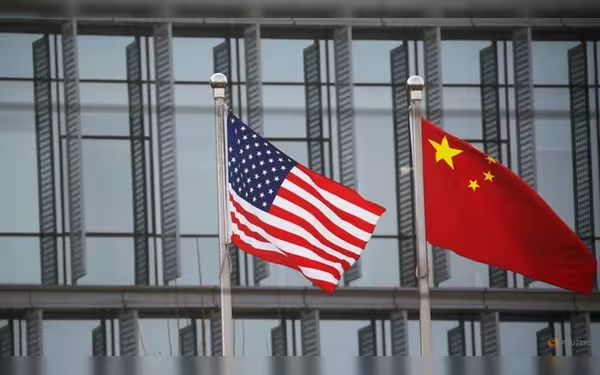Saturday, November 16, 2024 03:16 PM
US-China Rivalry: Global Implications and Economic Strategies
- US military alliances contrast with China's economic investments.
- China's Belt and Road Initiative attracts developing nations.
- US struggles to match China's economic offerings amid budget deficits.
 Image Credits: channelnewsasia
Image Credits: channelnewsasiaThe US-China rivalry shapes global politics, with military strength versus economic investments impacting nations worldwide.
The ongoing rivalry between the United States and China has become a defining feature of global politics in recent years. As both nations vie for power and influence, their foreign policies often reflect a deep-seated obsession with countering each other. The United States focuses on containing Chinese power, while China aims to limit American influence. However, the way these strategies are executed reveals significant differences between the two superpowers.
One of the United States' greatest strengths lies in its military capabilities. The U.S. has established collective defense agreements with 56 countries across Europe, Asia, and the Americas, showcasing its commitment to providing security guarantees to its allies. Additionally, the U.S. extends military aid to nations like Israel and Ukraine, even if they are not formal treaty allies. In stark contrast, China has a mutual defense treaty with only one country—North Korea. Furthermore, China faces territorial disputes with several neighboring countries, which often drives these nations closer to the United States.
When it comes to economic relations, however, China holds a distinct advantage. According to Australia’s Lowy Institute, 128 countries now trade more with China than with the United States. Over the past decade, China has invested over a trillion dollars in infrastructure projects across more than 140 countries, establishing itself as the world’s largest creditor and trading power. The impact of these investments is visible worldwide, from high-speed rail systems in Indonesia to ports and bridges in Africa, and even an intercontinental highway traversing Central Asia.
While Western nations often criticize the flaws in China’s Belt and Road Initiative—particularly the substantial debts incurred by countries like Pakistan, Sri Lanka, and Zambia—the appeal of Chinese investment remains strong for developing nations eager for rapid economic growth. As Daniel Runde, a former USAID official, noted in a recent Congressional hearing, "From project identification to signing, commencing and completing - China is much faster and cheaper than the United States at virtually every stage." This efficiency makes China an attractive partner for countries looking to advance their infrastructure and economic development.
In response to China's growing influence, the United States is attempting to push back. For instance, last year, America’s Eximbank signed a deal to finance over a billion dollars in transport and power projects in Angola. However, with a significant U.S. budget deficit and new trade deals stalled in Congress, it appears increasingly challenging for the United States to match China's economic offerings.
The rivalry between the United States and China presents both challenges and opportunities on the global stage. While the U.S. maintains its military dominance and a network of alliances, China's economic strategies are reshaping the landscape of international trade and investment. As countries navigate this complex environment, they must weigh the benefits and drawbacks of aligning with either superpower. Ultimately, the world risks losing if this rivalry escalates further, as it could lead to increased tensions and instability that affect nations far beyond the borders of the U.S. and China.













